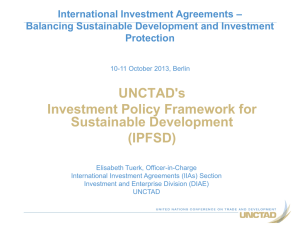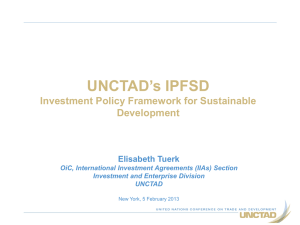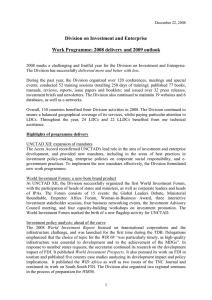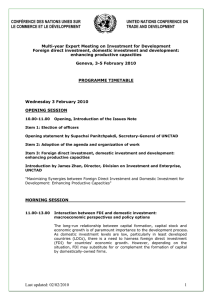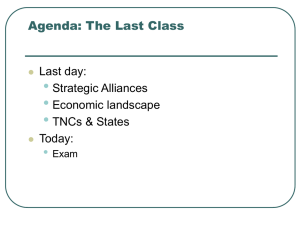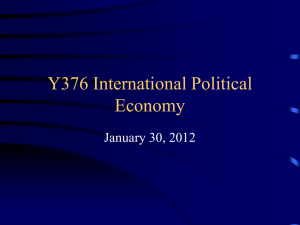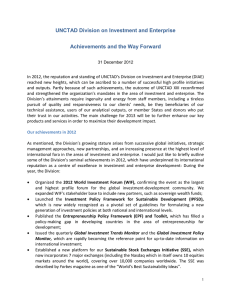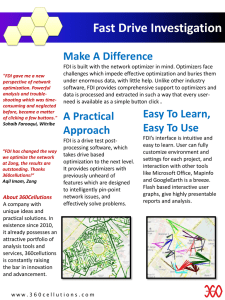Division on Investment and Enterprise
advertisement
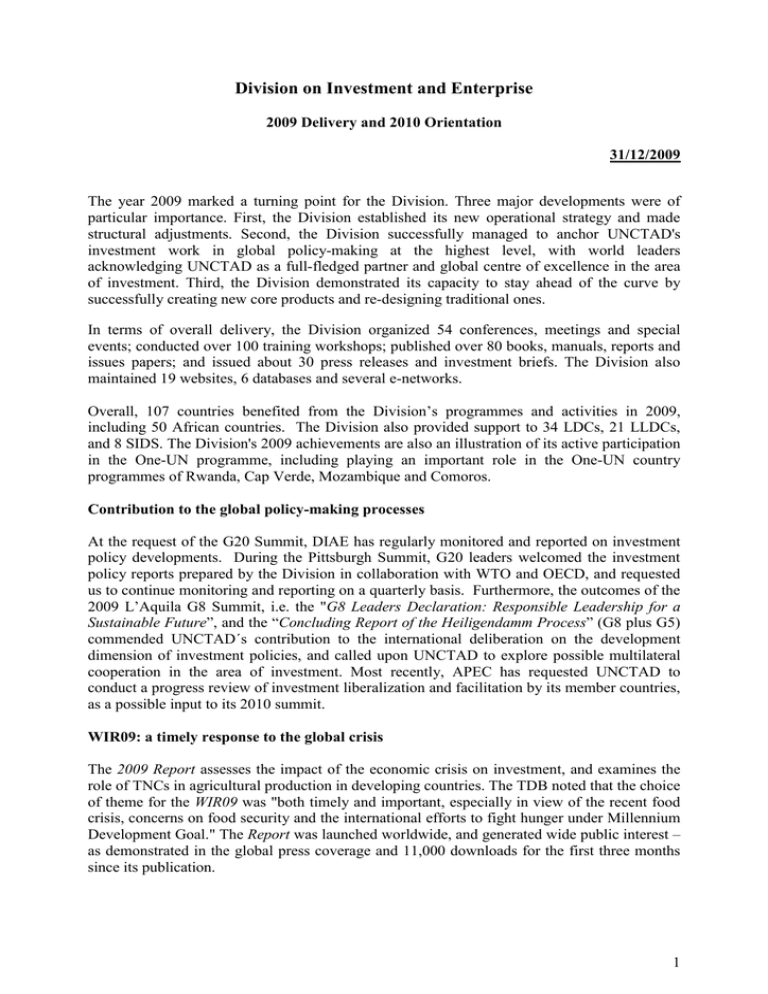
Division on Investment and Enterprise 2009 Delivery and 2010 Orientation 31/12/2009 The year 2009 marked a turning point for the Division. Three major developments were of particular importance. First, the Division established its new operational strategy and made structural adjustments. Second, the Division successfully managed to anchor UNCTAD's investment work in global policy-making at the highest level, with world leaders acknowledging UNCTAD as a full-fledged partner and global centre of excellence in the area of investment. Third, the Division demonstrated its capacity to stay ahead of the curve by successfully creating new core products and re-designing traditional ones. In terms of overall delivery, the Division organized 54 conferences, meetings and special events; conducted over 100 training workshops; published over 80 books, manuals, reports and issues papers; and issued about 30 press releases and investment briefs. The Division also maintained 19 websites, 6 databases and several e-networks. Overall, 107 countries benefited from the Division’s programmes and activities in 2009, including 50 African countries. The Division also provided support to 34 LDCs, 21 LLDCs, and 8 SIDS. The Division's 2009 achievements are also an illustration of its active participation in the One-UN programme, including playing an important role in the One-UN country programmes of Rwanda, Cap Verde, Mozambique and Comoros. Contribution to the global policy-making processes At the request of the G20 Summit, DIAE has regularly monitored and reported on investment policy developments. During the Pittsburgh Summit, G20 leaders welcomed the investment policy reports prepared by the Division in collaboration with WTO and OECD, and requested us to continue monitoring and reporting on a quarterly basis. Furthermore, the outcomes of the 2009 L’Aquila G8 Summit, i.e. the "G8 Leaders Declaration: Responsible Leadership for a Sustainable Future”, and the “Concluding Report of the Heiligendamm Process” (G8 plus G5) commended UNCTAD´s contribution to the international deliberation on the development dimension of investment policies, and called upon UNCTAD to explore possible multilateral cooperation in the area of investment. Most recently, APEC has requested UNCTAD to conduct a progress review of investment liberalization and facilitation by its member countries, as a possible input to its 2010 summit. WIR09: a timely response to the global crisis The 2009 Report assesses the impact of the economic crisis on investment, and examines the role of TNCs in agricultural production in developing countries. The TDB noted that the choice of theme for the WIR09 was "both timely and important, especially in view of the recent food crisis, concerns on food security and the international efforts to fight hunger under Millennium Development Goal." The Report was launched worldwide, and generated wide public interest – as demonstrated in the global press coverage and 11,000 downloads for the first three months since its publication. 1 The Commission: consensus on key policy issues The first session of the Investment, Enterprise and Development Commission was fruitful, both in terms of its outcomes and its deliberations. The Commission benefited from high-level participation throughout, including a number of ministerial (and above) delegates from capitals, as well as IPA's from 40 countries. The high-level segment focused on the economic and financial crisis. One important outcome of the Commission was to mandate the Division to monitor closely and report periodically on the latest developments in investment trends and policies. New products: Global Investment Trends Monitor and Investment Policy Monitor In response to the mandate of the Investment Commission, DIAE created two new core products – the Global Investment Trends Monitor and the Investment Policy Monitor. The two products are aimed at providing the international investment community with timely, online quarterly information and analysis on the latest global FDI trends and prospects, and investment policy developments. Both monitors were widely disseminated and well covered by mainstream media. They received overwhelming positive feedback from policy makers. IIAs: backstopping international investment regime Following the first session of the Multi-year Expert Meeting on Investment for Development (its innovative interactive format was commended by the participants as “collective advisory services”), the Commission decided to establish an annual forum on IIAs. DIAE, as the global focal point for IIA issues, continued to backstop the international investment regime throughout 2009. Activities included: research and policy analysis (five new studies of the IIA series and the monitor), information services (expanded databases and on-line network), capacity-building (six distance learning courses, two regional trainings and 10 national workshops), in addition to the promotion of consensus-building on IIA related issues (ad-hoc Expert Group meeting, 4 December). IPRs: catalytic in national investment policy reforms In 2009, four IPRs (Burkina Faso, Dominican Republic, Nigeria, and Viet Nam) were presented for intergovernmental review. Four IPRs reports (Belarus, Burundi, Mauritania, and Sierra Leone) were finalized. Another three IPRs (El Salvador, Guatemala and Macedonia) are at various stage of preparation. Eight countries benefited from IPR follow-up assistance and the implementation report of the IPR Ghana was finalized. In most cases, IPRs were part of the process of the overall national development strategy-setting and investment framework updating in the countries under the review. Investment promotion: capacity and institution building Two issues of the investment advisory series were launched in 2009. Advisory services on investor targeting strategies, IPA client charters, policy advocacy strategies and institutional support were provided to half a dozen countries. 10 national and regional workshops were organized to the benefit of some 300 participants. In addition, the Division further developed its i-Portal system, delivered investment guides and blue-books for LDCs and structurally weak economies. E-regulation: enhancing administrative efficiency The issue of administrative efficiency feature prominently on the agenda of both the 1st and the 2nd session of the Investment, Enterprise and Development Commission, partly due to the 2 importance of the issue itself and partly due to the sound analytical and technical work of the Division. The e-regulations system, designed to bring transparency and efficiency in administrative procedures related to investment creation and operations is now active in nine countries. Investment Information System: capacity-building in FDI statistics harmonization In 2009, in addition to regular updating databases on FDI, operations of TNCs and cross-border M&As, the Division continued its capacity-building efforts to collect, improve and harmonize statistics on FDI and TNCs in developing and transition economies. Nine national workshops (seven in the COMESA region and two in transition economies) were organized to introduce the UNCTAD common survey on FDI and TNC statistics. In addition, the UNCTAD Training Manual on Statistics for FDI and the Operations of TNCs was published in three volumes. Elearning materials (seven modules) are being prepared and will be available on the e-learning platform in 2010. Enterprise development: fostering entrepreneurship In 2009, DIAE continued to strengthen its work towards entrepreneurship development. This was achieved through consensus building (the multi-year expert meeting) and exchange of best practices, including through the organization of the annual Empretec Directors Meeting held in Jordan (26-28 October), which devoted a special session to the implications of economic downturn and recovery for SMEs. DIAE also hosted the first Global Entrepreneurship week – an international initiative to foster a global culture which recognizes entrepreneurs as drivers of economic and social prosperity. ISAR: addressing key and emerging challenges in corporate governance DIAE organized a conference on the financial crisis and its implications for the international financial reporting architecture and financial stability in July. The 26th session of ISAR addressed the impact of the financial crisis on IFRS. The Division co-hosted a high-level dialogue on sustainable stock markets, with the participation of executives of stock exchanges, security regulators and large institutional investors in November at UN Headquarters. This ahead-of-the-curve initiative has strengthened the Division’s area of work, and has established a new partnership with the Global Compact and the Principles for Responsible Investment initiative. Intellectual Property Rights: partnership for development The Division continued its strong partnership with ICTSD, WHO, WIPO and INWENT in addressing issues related to intellectual property for development. The Division launched on the occasion of ECOSOC a new project on building productive capacity for access to medicine in developing countries. The project will benefit from the research undertaken in the context of the Reference Guide to Using Intellectual Property Rights to Stimulate Pharmaceutical Production in Developing Countries. Reformulation of the Division’s operational strategy In line with the Secretary-General's "3C Principles" (Concentration, Communication and Cooperation), the Division formulated a new operational strategy and new methods of work. It also made structural adjustments in light of the Secretary-General’s guidance. The new strategy was the result of a participatory process involving the whole Division. It responded to two main objectives: (i) enhancing the quality, efficiency, effectiveness, relevance and impact of programme delivery, and (ii) fostering a culture of excellence in the Division. 3 The new strategy's foundation is DIAE's renewed commitment to work as one through the adoption of a common mission statement, a common vision of a global centre of excellence in its areas of work and an integrated management mechanism. It emphasizes three overall approaches: • A core-product-oriented approach to sharpen the focus on our core competencies (Concentration). The Division will concentrate on its two flagships (WIR and WIF) and seven core products/services, i.e. IPRs, IIAs, IIS (Investment Information Systems), IMonitor (trends and policies), ISAR, EMPRECTEC, and IFC (Investment Facilitation Compact). • An IT-enhanced approach to improve our cost-effective delivery (Communication). Built on the in-house IT tools and platforms, as well as its existing training manuals, the Division will develop e-based interactive training modules. The Division’s new training packages are expected to benefit more people at the country level at much lower costs and with less carbon foot print. The Division will also increase e-publications with a view to reducing by one-third the number of pages printed. This will be coupled with intensified efforts to proactively promote e-publications through web linking with our client websites and regular e-alerts of our new publications. • A networking approach to leverage resources and knowledge (Cooperation). The Division will actively pursue the development of online interactive networks in all areas of its work. This will allow us to build a strong community of stakeholders and others who actively involved in the Division's work and contribute to the creation of synergies among the three pillars. Challenges ahead 2010 will be another challenging year for the Division: • The crisis has significantly impacted FDI determinants and international production networks, and reshaped the FDI landscape. The post-crisis era will pose challenges to Division’s research and technical assistance. In 2010, the Division will revisit the evolving investment-development paradigm, and devise effective policy mechanisms to encourage FDI and TNCs to contribute to the coming low carbon economy. These key and emerging issues will be dealt with in WIR10, and at the forthcoming investment academic/think-tank conference, which will be organized on the occasion of the 20th anniversary of the WIR. Some structural and style improvements will be introduced to the WIR10, with new chapters of in-depth analysis on TNCs operations and investment policies. • The Division will organize the second World Investment Forum in 2010. It will focus on the overarching theme "Investment for Development: Opportunities, Challenges and Policy Options in a New Era". The WIF will offer a unique platform for dialogues and interactions among all investment stakeholders, including global leaders, senior policy makers, heads of IPAs, business executives, IIA negotiators, investment-related think-tanks and many others. It will also produce a number of deliverables. • With regards to the new operational strategy, the emphasis in 2010 will be on increasing the efficieny and effectiveness of technical assistance delivery. For example, through our IT-enhanced approach, we will build an integrated Investment Facilitation Compact by consolidating all our existing investment promotion and facilitation products and services (including E-regulation, i-Portal, Investment Guides, Investment Training courses, Invesstment advisory tools, etc). 4 • In the area of enterprise development, the Division will develop an Entrepreneurship Policy Framework (EPF), and synergize it with EMPRETEC. In delivering the entrepreneurship programme, special attention will be paid to women entrepreneurs, including through the second round of the Women Entrepreneurs Award. We will also try to strengthen our technical assistance capacity in the area of insurance. • In 2010, the Division will also make its best efforts to prepare a number of deliverables for the LDC IV Conference to be held in 2011. Throughout its overall programme delivery, the Division will pay special attention to LDCs, LLDCs, SIDS and structurally weak economies. Overall, in implementing its mandates of the Accra Accord, the Division will continue to follow UNCTAD Secretary-General’s vision and 3C Principles, as well as the Division’s five core values, i.e. relevance, quality, effeciency, effectiveness and impact. 5

